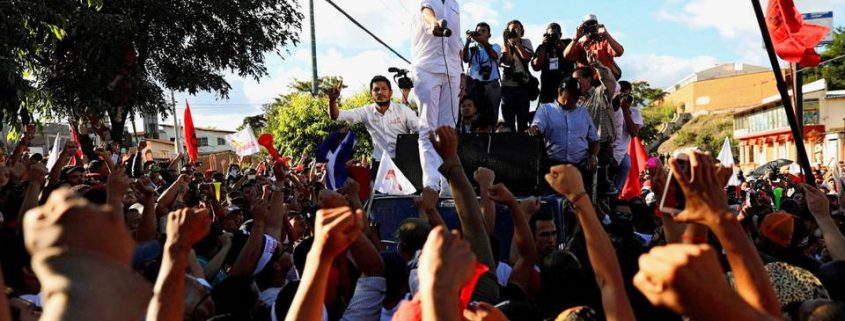US-trained Security Forces Kill Hondureños Amid Election Result Blackout
Hondureños took to the streets on Sunday, December 3, after security forces had shot and killed at least three protesters over the weekend. The people of Honduras charged the country’s election commission, the Supreme Electoral Tribunal, or the TSE—controlled by the US-backed incumbent President Juan Orlando Hernández —with stalling the results of their November 26th election, in an attempt to rig the outcome.
The situation for the people of Honduras has rapidly deteriorated since the initial attack by security forces. The country has suspended constitutional rights by implementing a curfew, and the US-trained police and elite forces are now actively suppressing and opening fire on revolting Hondureños.
State militarized police forces, backed by elite military units, responded by launching tear gas into a crowd of an estimated 1,000 Hondureños —including families with their children and elderly relatives.
According to the Intercept, “observers on the ground… have seen elite military police from the TIGRES and Cobras units alongside the Honduran National Police involved in clashes with protesters in the capital, Tegucigalpa, and around the country. The three forces are increasingly coordinated as the violence soars, they say.” The Honduran TIGRES (Tropa de Inteligencia y Grupos de Respuesta Especial de Seguridad) and Cobra (Comando y Batallón de Reacción Antiterrorista) units are elite forces trained by US special forces, and specialize in counter-terrorism and narco-trafficking related matters.
People have taken to Twitter since Friday, reporting that the 6 P.M. curfew has created lawlessness in the streets, and has left them vulnerable to police violence, killings, and even rape. One particular video that has gone viral shows Honduran security forces dragging an individual away across a dim-lit street.
This election saw Hernández running against Salvador Nasralla, “an ex-sportscaster chosen by an alliance of left-wing political parties as their candidate.” Initial tallies of the vote were significant enough that the TSE was reporting Nasralla was holding a substantial lead over Hernández, so much so, in fact, that a representative of the TSE noted it as “irreversible.”
Not long after, the narrative suddenly changed. The TSE had begun reporting that the incumbent, Hernández, had managed to close the gap. Without providing the new tally the tribunal suddenly went dark. The intercept states, “it suddenly stopped publicizing the tally, alleging that its electronic system went down, prompting criticism from European Union election observers.”
The blackout of the TSE is what largely prompted Hondureños to take to the streets.
Following the growing number of people, Hernández ordered the military-imposed curfew on Friday, December 1st, officially lifting all rights and subverting any specter of democracy left in the country. Many suspect the curfew as buying time for the TSE to possibly alter the results. Without any internal monitoring of the election results, there is no guarantee. According to some Human Rights observers, “the curfew and delay of an official recount are steps to produce an inevitable Hernández victory, regardless of the vote tally.”
The Honduran government and police forces have for years received training and large amounts of funding from the United States government in its long controversial relationship fighting narco-trafficking in Central America. Having run on a platform of fighting crime and stopping the drug trade, Hernández’s administration has won the support of neoliberals and neoconservatives in the US, alike.
The Intercept states, “Figures compiled by the Security Assistance Monitor show that Honduras has received nearly $114 million in security support since 2009.” Such funding has often supported neo-fascist regimes across the globe, in the name of suppressing popular movements—often fighting for land and agrarian reform—and protecting economic investment and development in the interest of global financial and corporate institutions.
The escalation in Honduras hits hard as Donald Trump and Republicans use their anti-immigrant rhetoric to attack TPS, Temporary Protected Status, which has helped many Hondureños, as well as Nicaragüenses and Haitians escape the tragedy and violence caused by US foreign policy in the region.
Such atrocities are known all too well by Hondureño activists, like the late Roberta Caceres, living in the aftermath of the 2009 Honduran Coup. The legacy of destruction to human life left by Ronald Reagan’s foreign policy, and those administrations that followed, casts a long and dark shadow over Central America. The US-backed violence proves the blood that has stained America’s hands has yet to wash off.




Leave a Reply
Want to join the discussion?Feel free to contribute!